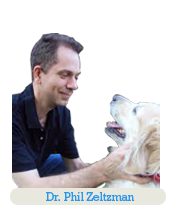
Dr. Phil Zeltzman is a mobile, board-certified surgeon in Allentown, PA. His website is www.DrPhilZeltzman.com. He is the co-author of “Walk a Hound, Lose a Pound” (www.WalkaHound.com).
One of the scariest and most life-threatening emergency situations a dog lover can face is the dreaded bloat.
What is bloat?
Bloat is really a misnomer. Bloat by itself is a condition in which the stomach becomes bloated with gas (occasionally liquid, occasionally too much food). This is very different from another condition where in addition to bloating, the stomach can twist on its own axis. This more serious condition results in a series of complex changes that affect virtually every organ and can cause death. It’s called Gastric Dilatation Volvulus (GDV), stomach torsion, flipped stomach or twisted stomach. Many people mistakenly call either situation “bloat,” which is often confusing.
Adding to the confusion is the fact that bloat can lead to GDV and vice-versa.
What are risk factors of bloat and GDV?
Factors that increase a dog’s risk of both bloat and GDV include:
- Being deep chested
- Exercising after eating
- Being a large or giant breed dog2 (Great Danes are the number 1 most affected breed)
- Being a male1
- Being older3 (over 7 years of age)
- Having a first-degree relative with bloat3
- Being underweight1
- Eating one meal daily1
- Eating large volumes of food1
- Eating quickly1
- Consuming dry food containing fat among the first four ingredients1
- Being fearful1 (nervous or anxious)
One of the most universally recognized factors known to cause bloat is “stress” in the medical sense of the term1. That can be almost anything: a dog show, thunder, hospitalization, boarding etc.
Can bloat be prevented?
It’s very difficult to prevent bloat. At best, we can try to decrease the risk by studying the risk factors.
Here are a few guidelines:
- Avoid heavy activity after eating
- Feed your dog several smaller meals during the day
- Slow down your dog’s eating and make sure fat is not among the first four ingredients in his food
The main factor that seems to decrease the risk of bloat is a "happy" temperament1. You can try to reduce stress and anxiety in your dog, but that is not always easy if your dog is a show dog or if he is terrified of thunder.
Unfortunately, most other factors are impossible to change, such as your dog’s gender, breed and age! One can hope that better genetic selection will help the breeds at greater risk like Great Danes, setters and German shepherds, but this is a long-term project.
Can GDV be prevented?
As a reminder, GDV means that the stomach has twisted. Fortunately, this condition can be prevented.
A preventive surgery, called gastropexy, can be performed to prevent the stomach from twisting. In surgery, the stomach is tacked or stitched to the inside of the belly. As long as it is performed correctly, the prevention is successful in at least 95% of cases.
There are basically 3 good times to perform a preventive i.e., prophylactic gastropexy:
- At the time of neutering or spaying (when your dog is already under anesthesia) — this is the best time in my mind because presumably your pet is young.
- When your dog is under anesthesia for another procedure, e.g., a lump removal
- Whenever you and your veterinarian decide that it’s a good idea, even if your dog is not undergoing another surgery
If your dog needs surgery to treat bloat or GDV, then a gastropexy is a mandatory step. Make sure this will be performed by your veterinarian at the time of surgery — otherwise the condition is very likely to recur.
Performing a gastropexy
There are multiple ways to perform a gastropexy. Which one is chosen is not as important as the experience of the person doing it, so this is an important topic to discuss with your veterinarian. If ever in doubt, ask to be referred to a board-certified surgeon.
It is critical to understand that even if your dog is “tacked,” bloat is still possible and requires a trip to the veterinarian or the emergency clinic. However, surgery will most likely not be necessary.
In conclusion, some risk factors are out of your hands. Fortunately, some risks can be reduced or eliminated. Above all, ask your family vet or a surgeon if your dog would benefit from a prophylactic gastropexy. It’s a simple and reasonably priced procedure that can save your dog’s life.
Now find out if ice water can cause a hot dog to bloat >>
If you have any questions or concerns, you should always visit or call your veterinarian -- they are your best resource to ensure the health and well-being of your pets.
References:
1. Glickman, L.T., Glickman, N.W., Schellenberg, D.B, Simpson, K., and Lantz, G.C. "Result Filters." National Center for Biotechnology Information. U.S. National Library of Medicine, May 1997. Web. 14 Aug. 2014
2. Hunter, David J., Lawrence T. Glickman, VMD, DrPH, Nita W. Glickman, MS, MPHS, Diana B.Schellenberg, MS, Malathi Raghavan, DVM, MS, and Tana Lee, BA. "Non-Dietary Factors as Risk Factors for Breast Cancer, and as Effect Modifiers of the Association of Fat Intake and Risk of Breast Cancer." Cancer Causes & Control 8.1 (1997): 49-56. JAVMA, Nov. 2000. Web. 14 Aug. 2014.
3. Raghavan, Malathi. "Purdue E-Pubs." Purdue EPubs. Purdue University, n.d. Web. 14 Aug.
